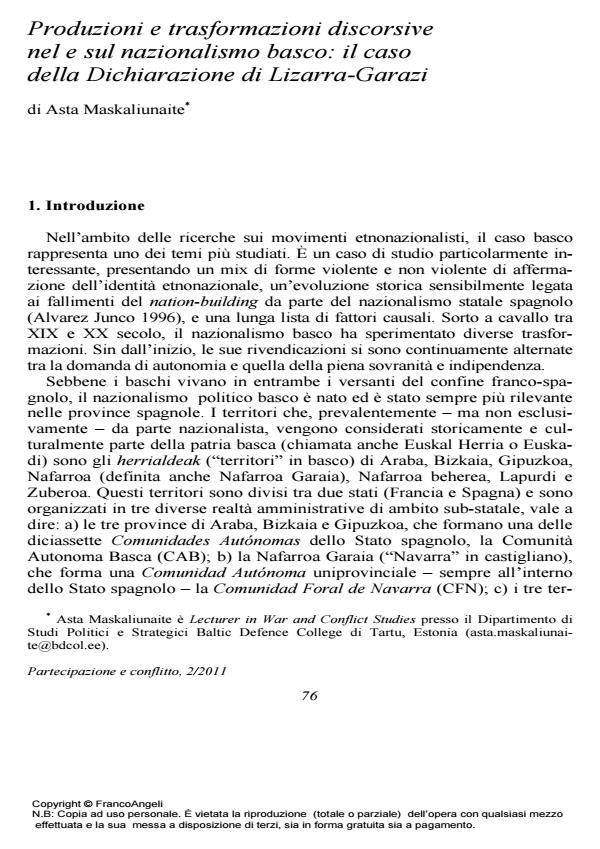Discursive formations and transformations of and around the Basque nationalism: the case of Lizarra-Garazi Declaration
Journal title PARTECIPAZIONE E CONFLITTO
Author/s Asta Maskaliunaite
Publishing Year 2011 Issue 2011/2
Language Italian Pages 23 P. 76-95 File size 556 KB
DOI 10.3280/PACO2011-002004
DOI is like a bar code for intellectual property: to have more infomation
click here
Below, you can see the article first page
If you want to buy this article in PDF format, you can do it, following the instructions to buy download credits

FrancoAngeli is member of Publishers International Linking Association, Inc (PILA), a not-for-profit association which run the CrossRef service enabling links to and from online scholarly content.
When it comes to research on the ethno-territorial movements, the case of the Basque nationalism seem to be one of the more popular subjects for investigation. It presents an especially interesting case for analysis with a mix of violent and nonviolent forms of mobilization. During the democratic post-Franco era, all the attempts to end violence seem to be doomed to fail; the divisions remain as strong as before both within the Basque nationalism and between Basque and Spanish political forces. Consequently, the misunderstandings, different interpretations of the same facts, different narratives creating even deeper divides between the political actors flourish as much as before. In the article is examined just one particular episode in the historical development of the Basque (and Spanish) nationalism: i.e. the events surrounding the signing and further interpretation of the 1998 Declaration of Lizarra. Already at a time when it was signed the Declaration of Lizarra became one of the most controversially interpreted documents in the Basque politics, and it had been shaping the Basque( and Spanish) political debate also in the following years. Studying this case it is illustrated the difficult relationship between violent and non-violent parties in ethnonationalist movements, as well as the complicated interaction between the regional ethnonationalist political parties and the state ones. Furthermore, the case serves as a good illustration of how the political discourse is transformed and as an illustration of the importance of interpretation in politics and of the use of "historical discourse" in these interpretations. It will show how the new political myths are created and how they inform the future interrelations between the involved parties.
Keywords: Basque Nationalism and Politics; Spanish Nationalism; Political Myth; Political Discourse; Peace Processes; Ethnonationalist Conflicts
Asta Maskaliunaite, Produzioni e trasformazioni discorsive nel e sul nazionalismo basco: il caso della Dichiarazione di Lizarra-Garazi in "PARTECIPAZIONE E CONFLITTO" 2/2011, pp 76-95, DOI: 10.3280/PACO2011-002004